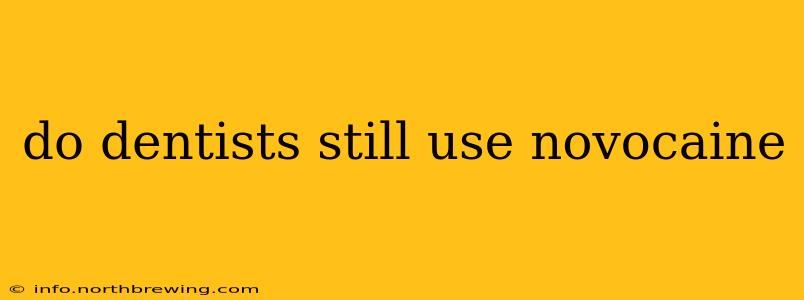Do Dentists Still Use Novocaine?
While the name "Novocaine" is synonymous with dental numbing, the answer is a bit more nuanced than a simple yes or no. While dentists don't commonly use the brand name Novocaine (procaine) as their primary anesthetic anymore, the principles behind it—local anesthetic injection to numb the area before dental procedures—are still very much in practice. Modern dentistry employs a range of more effective and longer-lasting alternatives. Let's delve deeper.
What is Novocaine?
Novocaine, or procaine, was a revolutionary anesthetic when it was first introduced. It provided effective local anesthesia, temporarily blocking nerve signals to prevent pain. However, it has several limitations compared to modern options.
Why Don't Dentists Use Novocaine as Much Anymore?
Several factors contributed to the decline in the use of Novocaine in modern dentistry:
- Shorter Duration: Compared to newer anesthetics, Novocaine's numbing effect doesn't last as long. This means patients might experience discomfort sooner after the procedure.
- Allergic Reactions: Although rare, allergic reactions to procaine can occur. Dentists prefer using anesthetics with a lower incidence of allergic reactions.
- Less Potent: Modern anesthetics are generally more potent, requiring smaller injection volumes for the same level of numbing. This translates to a more comfortable experience for the patient.
- Availability of Better Alternatives: The development of superior local anesthetics like lidocaine (Xylocaine), articaine (Septocaine), and bupivacaine (Marcaine) has rendered Novocaine largely obsolete in most dental practices. These newer options offer longer-lasting effects, improved potency, and reduced risk of allergic reactions.
What Anesthetics Do Dentists Use Today?
Today's dentists typically use a variety of local anesthetics, most commonly lidocaine, articaine, and bupivacaine. The choice of anesthetic depends on factors such as the type of procedure, the patient's medical history, and the desired duration of numbness. These anesthetics often contain a vasoconstrictor like epinephrine to help prolong the numbing effect and minimize bleeding.
Is Novocaine Still Used in Any Capacity?
While not routinely used for routine dental procedures, procaine might still find limited application in some specialized situations or in certain regions where access to newer anesthetics is limited. However, this is the exception rather than the rule.
What are the Side Effects of Dental Anesthetics?
Most patients experience minimal side effects from modern dental anesthetics. Common side effects can include temporary numbness, slight bleeding at the injection site, and a slight burning sensation during injection. Rarely, more serious side effects can occur, such as allergic reactions. It's crucial to inform your dentist about any allergies or medical conditions before any procedure.
How Long Does the Numbness Last After a Dental Injection?
The duration of numbness depends on the type of anesthetic used and the area being treated. Generally, the numbing effect lasts for several hours, but this can vary significantly. Your dentist will be able to provide you with a more accurate estimate based on the specific anesthetic and procedure.
Are there Alternatives to Needle Injections for Dental Anesthesia?
While needle injections remain the most common method for administering dental anesthetics, research is ongoing into alternative methods. Topical anesthetics can provide some level of surface numbing, but they are generally not sufficient for extensive procedures. More advanced techniques are being explored, but needle injections remain the gold standard for effective pain management during most dental procedures.
In conclusion, while the name "Novocaine" remains a familiar term, modern dentistry relies on more effective and safer alternatives for local anesthesia. Patients can rest assured that the numbing techniques used today are designed to minimize discomfort and ensure a comfortable dental experience.
